MDDC Council Members
Austin Carr
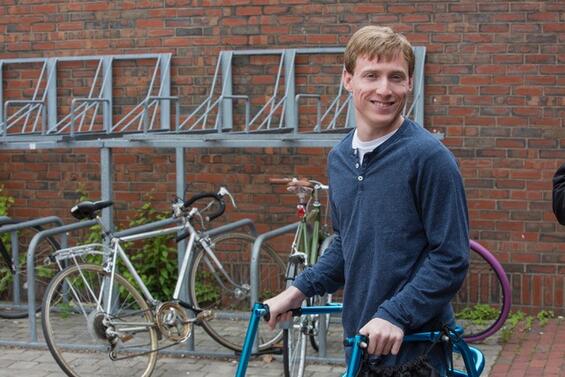
I’m a disability advocate and I am going to graduate this Spring with my Developmental Direct Support certificate.
I work with the MDDC, Easter Seals, and the Federation for Children with Special Needs. I also have a paid job in the community.
I have an intellectual disability and quadriplegic cerebral palsy. Even though we have intellectual disabilities, we’re still worthy people, and we give back to our community. We enrich people’s lives – a group of other self-advocates and I founded an organization to provide social opportunities for adults with disabilities called Access 2 Community and Friendship. I want to be a part of my community just like anyone else; we deserve a place in this world.
I need my Medicaid services to live my life. For example, I need my PCAs to help with my activities of daily living, like getting dressed and showered. MassHealth also provides access to individual services like OT, PT, speech therapies, and behavioral health supports. Please support MassHealth and Medicaid! We need these services to live fulfilling lives just like anyone else.
Sandra Heller
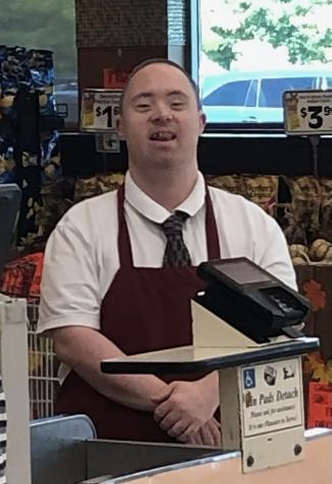
Craig working at Market Basket in New Bedford, MA.
My name is Sandra Heller, and I am from Marion, Massachusetts. My son Craig is a 36-year-old active citizen. He was born with Down Syndrome and now lives in Fairhaven, MA where he rents a home with a roommate. He is also an accomplished and published photographer specializing in black and white images.
Craig works part time at Market Basket. He is a valued member of his team. Working gives Craig a sense of purpose and its important part of his pride and identity. Medicaid services for people with intellectual and developmental disabilities face greater barriers to working so these services make it possible for people with intellectual and developmental disabilities (IDD) to achieve competitive and integrative employment using a supported employment model. People with IDD deserve the dignity of work. Medicaid supported employment services have helped Craig be more self-sufficient and have greater financial security.
According to Craig, "Medicaid is important to me because I want a life like everyone else! I work, vote and live in my community and without Medicaid services I couldn't do any of these things."
Cynthia Laine

Luke and Ryan attending Ryan's middle school graduation.
As a parent of two autistic sons, one 14 and one 15, I understand firsthand just how essential Medicaid is to families like ours. My 14-year-old son is nonverbal, and without the critical services Medicaid provides, he would not have access to the tools he needs to communicate and navigate the world around him. Cutting Medicaid would not just harm our family, it would devastate countless families who rely on it as a lifeline.
For children with autism, especially those who are nonverbal, Medicaid is more than just healthcare, it's a pathway to independence. My sons have access to:
- Therapies and treatments, such as speech therapy, occupational therapy, and Applied Behavior Analysis (ABA), which are essential for developing communication and life skills. These services have given my 14-year-old the ability to express his needs in ways that go beyond words.
- Specialized care that addresses their unique developmental needs without forcing us to choose between healthcare and necessities.
- Mental health support that helps them manage sensory sensitivities, anxiety, and other challenges common in children on the spectrum.
- In-home services that help create a safe and stable environment for our family.
Because of Medicaid, my sons have made incredible progress. Every small step, whether it's expressing emotions through gestures or making connections with peers, represents hours of therapy and support. These gains are fragile, and cutting Medicaid would disrupt the very foundation that allows them to grow and thrive.
My boys are not just statistics, they are bright, determined young men with untapped potential and big dreams. Medicaid helps ensure they have the resources they need to reach that potential. Without it, families like mine would be left without options.
I am pleading with decision-makers to understand what's really at stake. When Medicaid is cut, it's not just budgets being slashed it's the futures of children like mine. Our children deserve the opportunity to thrive, and Medicaid makes that possible.
Paul Lutfy
Eric attending a baseball game at McCoy Stadium.
Medicaid is so important to my 31-year-old adult son Eric and our family. My son was born with a significant intellectual and developmental disability and requires 24/7 support to be safe and engaged. Eric loves music, adaptive computer games like bowling, other iPad games, and enjoys socializing. With the right support and services Eric enjoys living in the community. Eric lived with us until he turned twenty and we provided much of the care and support he needed. My wife and I are now aging, and we can’t provide all the physical care and support he requires.
Medicaid provides Eric with the necessary personal care support to do his activities of daily living (i.e., bathing, dressing, shopping, eating, etc.). Eric now lives in the community in a group home with 24-hour nursing support. Medicaid services allow Eric to live as independently as possible with the day-to-day assistance he needs to be a productive contributing member of society.
Medicaid also helps Eric to stay healthy. Medicaid provides Eric with medical coverage and healthcare services. Medicaid also helps pay for medications, medical supplies, transportation to medical appointments, wheelchair equipment and repairs, etc.
While Eric is an adult and even though we are not legally obligated to support him financially in his adult years, my wife and I still buy him clothes, toiletries, bath towels, bed sheets, shampoo, etc. because eligible Medicaid recipients have very little means and live in poverty. My wife and I also serve as Eric’s Rep Payee and manage his asset paperwork. We also serve as his guardian to help ensure he is treated with dignity and has what he needs. My wife and I also take Eric out to museums, movies, civic and community events. These opportunities bring great joy and meaning to his life.
Medicaid has made it possible for Eric to pursue his hopes, dreams, and aspirations like any other American. Without Medicaid he would be forced into a more costly segregated institutional setting. Without Medicaid he would not be the healthy and productive citizen he is today.
Amber Pettell
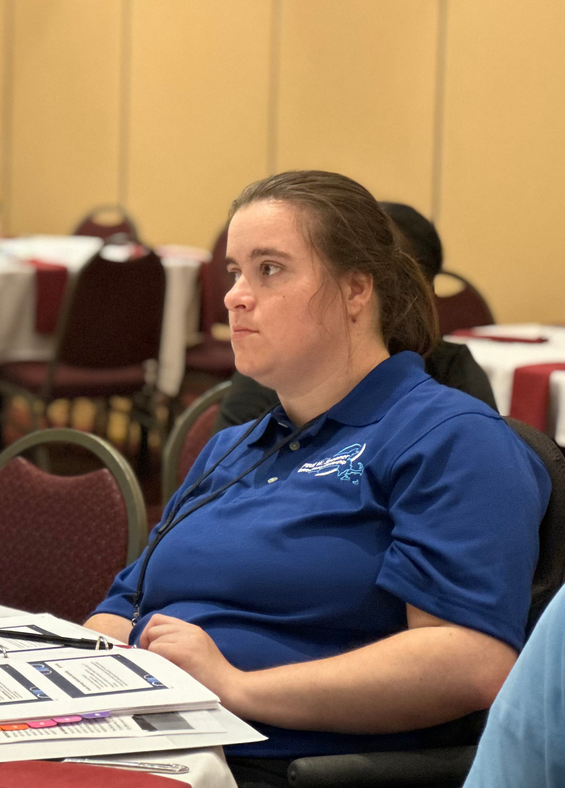
Amber mentoring new emerging leaders at the Paul W. Spooner Generational Leadership Summit.
With Medicaid, I'm able to work a job that I love and support others with disabilities because I have the support I need to stay healthy and do the things I want and need to do. I have Master's degree and I have accomplished many of my biggest goals in life. None of this would have been possible without the support I get through Medicaid. I live with quadriplegic cerebral palsy and I need a caregiver to get out of bed, get ready for the day, get to work and use the bathroom. If Medicaid is cut, I will not have basic support to meet any of my basic physical needs.
Cody Rooney
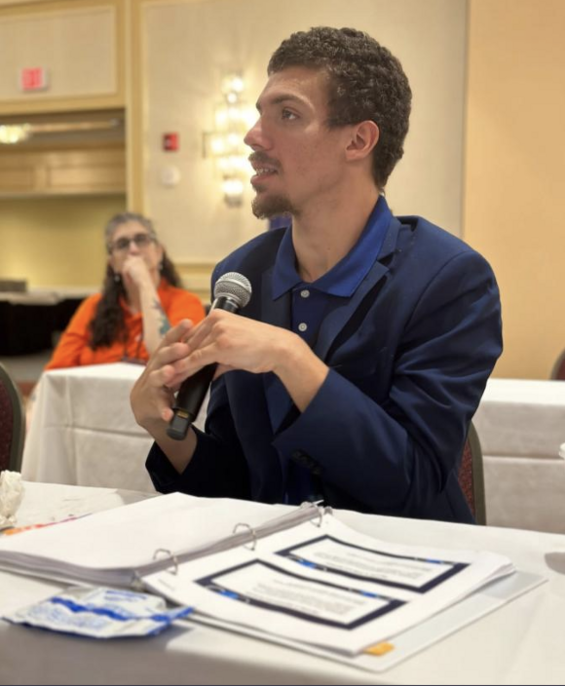
Cody mentoring new emerging leaders at the Paul W. Spooner Generational Leadership Summit.
MassHealth (Medicaid) helps pay for my Personal Care Attendants (PCAs) who help me get around with transportation. Also, my PCAs help with grooming and things like nail cutting; without my PCAs it would look like I had claws! I’m a college student at UMass Amherst, and when I’m not on campus or I don’t have access to dining halls I also need PCAs help me cook and prepare meals.
Tatiana Thomas
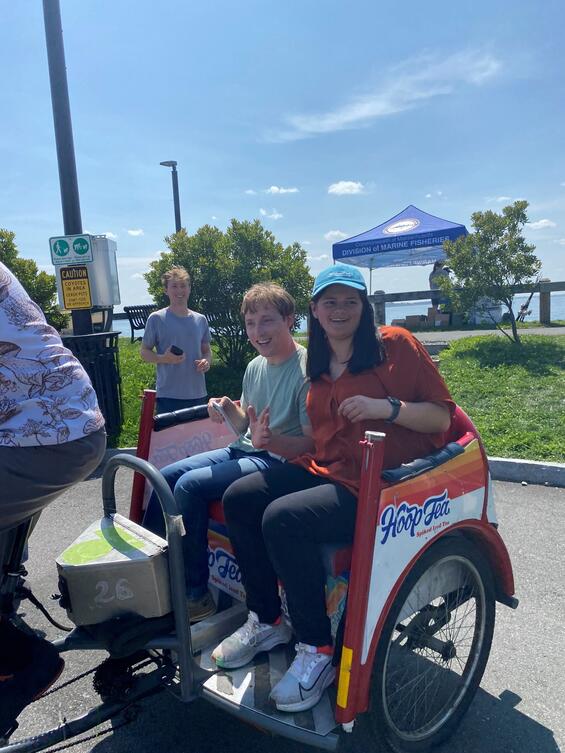
Tatiana with Austin and Andrew Carr at a park riding in a pedicab.
I attend Mass Bay Community College under the transitions program. I’m also a leader in my community. I am on the advisory boards for the Federation of Children with Special Needs and the Department for Public Health where we do work focused on youth with disabilities in hospitals. I have an intellectual disability. I work at two part-time jobs – I work as a lunch attendant at Somerville Public Schools. My other job is a customer rep at CVS Pharmacy.
MassHealth is very important to me because it covers all my healthcare needs. It helps with doctor visits and adult dental visits. The Department of Developmental Services (DDS) and MassAbility also help me; they were at my IEP meetings. They helped me get job coaches and pay for my college.
These supports have been helpful to get services I need. Now, I get to work jobs in the community. I’m even a leader and I give back, including to my Latino community. I’m an important connection for other people. I helped start an organization called Access 2 Community and Friendship.
When I get supports from MassHealth, it helps me support other people too. Please protect Medicaid!
Community Members
Christine Hubbard
My son who experiences a developmental disability lives out in the community with 4 other adults in a group home which is staffed by 4 people 24/7. Due to the nature of his disability and the needs of his roommates, there are 4 direct care staff members who are in the home 24/7 to assist them with their activities of daily living so they can live meaningful lives in a setting that is not an institution. 5 days a week he attends a day habilitation program, a program that helps people develop skills to live independently in the community. He enjoys a variety of volunteer activities, including helping to deliver Meals on Wheels to seniors. These Medicaid services make sure he also has access to social activities and medical care, including nursing care and psychopharmacological services. His individual needs require a caregiver to prompt him through his day and keep him safe and ensure he has the support he needs to help with all activities of daily living (i.e., grooming, dressing, bathing, eating, getting to sleep, transportation, exercise, leisure activities, etc.) His disability limits his ability to communicate, and the Medicaid services that provide his direct care services helps to ensure he is able to express his wants and needs. If Medicaid is cut, our family and my son will not have basic support for him to survive.
Francesco Hladyz
Francesco spending time outdoors.
I’m a person with an intellectual and developmental disability. Medicaid has helped me in my community. It increased my independence and helped me maintain a job. The transportation that is offered through Medicaid is important because I live in Central Mass. where there is little to no transportation so I would not be able to get to and from work on a daily basis. Medicaid services has helped me also with day-to-day hygiene and a Homemaker that comes to my house to help me clean and teach me to cook. I need a Personal Care Attendant (PCA) to help me with my hygiene which is important for me stay healthy. Potential cuts to Medicaid services would make it hard for people with intellectual and/or developmental disabilities to be as productive and independent as possible.
Reliable transportation Medicaid services provide ensure people that can't afford/access public transportation or other transportation such as Lyft or Uber so they can get to work, doctors appointments, the grocery store, pharmacy and much more. I strongly think that you have to understand this before you cut any funding. Access to Medicaid services help people with disabilities and others who are low-income stay healthy and access medical supports and services. I don’t know what would I do without medication. I would be very sick, and I couldn’t afford my prescriptions or my doctors’ appointments.
What I'm trying to say is if you cut something like Medicaid, you’re basically cutting a piece of the puzzle that's necessary for people with disabilities to live productive and meaningful lives in the community. Medicaid really matters to the disability community. We need support and Medicaid is the answer for it!
Kelsey Oates
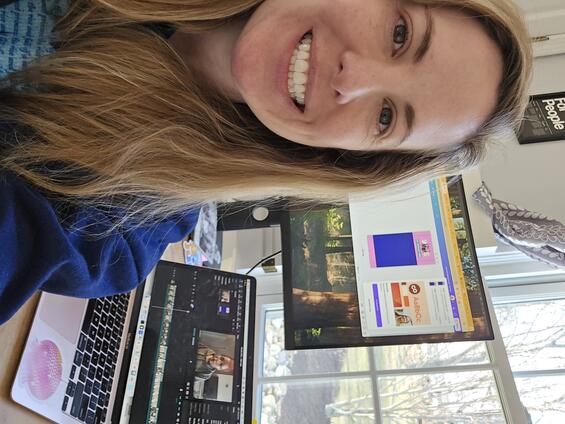
Kelsey working on a video edit.
I am working and a creative person. I have long struggled with mental illness, and Medicaid has enabled me to go to the hospital when I've needed inpatient care as well as allowing me to attend partial hospitalization programs. Medicaid also paid for my medication. Without Medicaid, I would not have been able to get treatment, and honestly I might be dead right now. I'm now on Medicare, with Medicaid as my backup. Without these programs, I would not be able to live a full, productive life and overcome my illnesses.